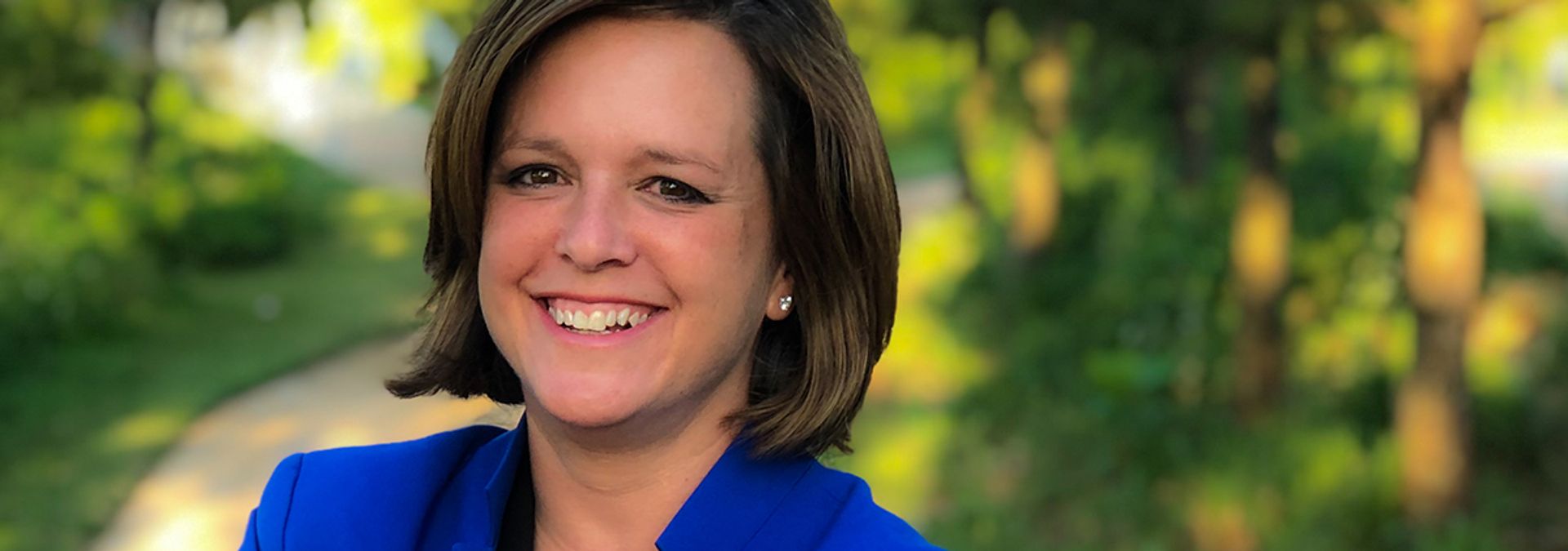
'There is nothing more important than air quality': A conversation with Rep. Ann Johnson
Rep. Ann Johnson defeated incumbent Sarah Davis in November 2020 to represent Texas House District 134 in Houston.
Ann Johnson’s parents made Election Day a celebration in their large Texas family. The youngest of six and the daughter of elected officials, Johnson said she used to tag along with her parents when they voted. “I remember how important it was for them that we get involved in the civic process,” she says. “They taught me the value of public service.”
Johnson took that to heart and built a successful career in Houston as a prosecutor focused on human trafficking. She now represents vulnerable people who cannot afford a lawyer — and, as of Election Day, is taking on a new role in public service of her own, defeating Republican incumbent Sarah Davis to become the newly elected representative of Texas House District 134 in Houston.
Johnson’s campaign focused on funding public education and advocating for the health and safety of Texas families. She now approaches what will certainly be a very busy 2021 legislative session in a state with big problems to solve.
We talked for nearly an hour about everything from redistricting to budgeting, clean energy to political polarization. What stood out to me were Johnson’s optimism and tenacity. “We were able to run a hard campaign talking about these issues,” she says, “and I'm honored that the voters got the importance of the need to have somebody that would make really tough decisions in a tough time. I'm excited.”
Our conversation has been edited and condensed for clarity.
Jennifer Schmerling: You spoke to the Texas Tribune about coming together to make decisions that are community-based and good for Texas families. I'm wondering what issues you think the Democratic caucus and the Republican caucus are most likely to find compromise on.
Ann Johnson: I think this is going to be a really hard session, and I think everybody anticipates that because we only meet every two years. Even though we've had incidents like Hurricane Harvey, we've had mass shootings, we've now had COVID, the legislature has not been called into special session, and so it leaves us in a very vulnerable position of only having about five months to get together to resolve the most significant issues in the state.
Primary in that is the budget. Every two years, we have to pass our budget, a balanced budget, and we not only have to satisfy the debts that were incurred in the past, but we have to try to plan for two years ahead.
This is going to be a tough session because of COVID-19. It's going to physically be a tough session because we don't even know that we'll be able to be together to properly social distance, wear masks and advance the interests of the people of Texas. We are at a $4.6 billion deficit because of the failed policy planning in the past. I am hopeful that we can have some very real conversations around the budget about what we need to do going forward to have a better foundation.
With partisanship, I think we're seeing a real challenge in the Republican party between those individuals who have the potential and understand the need to work across the aisle on issues such as Medicaid expansion. We're talking about the economic and health impact in the state of Texas, and the failure to advance this interest is hurting all of us. I hope that Republicans will continue to move, but I'm concerned about their chair, Allen West, who seems to be taking extremely divisive positions and threatening the membership of the party if they don't go along with him. I don't think that's good for Texas. I hope that members will have the strength to break from that extremism.
JS: I did want to talk more about health care. You've spoken about pushing for Medicaid expansion, and it does seem to be becoming a more popular issue across the South and with fenceline communities near the refineries heavily affected by air quality issues, work safety issues. They are all considered essential workers at this time, and so they're having to go to work and deal with COVID risks in addition to their existing environmental risks. How can we make work safer for people during the pandemic and overall?
AJ: I'm very hopeful that a Biden-Harris administration will be able to advance their interests and start pushing for something like the HEROES Act that was passed in Congress and is waiting on the Senate, and Senator Mitch McConnell has not taken up for a vote.
Aside from the HEROES Act, there's still CARES funds from the federal government, about $9 billion sent to Texas. There's still about $5 billion to $6 billion that's waiting to be disbursed by the governor's office. Unfortunately, because we're not having public hearings, nobody has been cued into this issue, and so I hope that the governor's office finds an avenue to disburse those funds in the manner in which they can.
That would obviously include not only advancements and personal protective equipment for public schools and students and teachers, but also essential workers across the board, ensuring that we try to get from a state level the necessary equipment that can be used to protect them, in this moment where we see, in Houston, our case count going through the roof. You're right. There are people who have to show up for work, and we need them to show up for work, our transportation workers, our farm workers, our grocery workers. These are the individuals we need.
But let's talk about those neighborhoods and the protection that's needed aside from COVID, which is TCEQ, the Texas Commission on Environmental Quality. Their teeth got taken away from them over this decade, because we've seen the funding for their regulatory authority and their personnel to go out and check in these locations has been drastically cut.
So we have to have a long-term commitment to advancing the interests of TCEQ to put some strength back into the regulations and ensure that their people are being able to get out there and do their job. There is nothing more important than air and water quality. We're seeing many vulnerable populations around refineries and other facilities have a higher health risk because maybe we're not doing that job.
That's one issue. Then, of course, you're right. When people are sick, they need coverage. Medicaid expansion is becoming more popular. We are only one of 11 states that have refused to do it. You've had the decade to prove the point that it makes no economic sense. It makes no sense in terms of human cost. We are literally talking about saving lives and providing coverage, providing the federal funds we already paid to come back home to our state to help the most vulnerable. To me it’s a no-brainer and has been for more than a decade.
JS: Let's talk TCEQ for a minute. You mentioned that the teeth have been taken out of their regulatory efforts. We know that we had six chemical fires in 2019 into 2020. The Houston Chronicle reported that the Houston area sees a major chemical incident about every six weeks. In addition to providing extra funding and bringing back staffers, how can the legislature work to make sure that regulation and enforcement is happening?
AJ: Well, I can say that I will do everything I can from our state representative position to continue to highlight the issue. There are some positions where partisanship can come into play, or there are appointments made that maybe are not getting public attention. Obviously, right now, as we talked about with CARES funds disbursement, we're not having public meetings, we're not having public hearings, and so people are not getting a chance to step in. Representative Donna Howard has really been pushing that issue out of Austin and talking about it.
This was an important campaign issue, and we talked about the fact that we need to advance our interest around renewable energy going forward. Obviously, that also includes the current continuation of explosions or spills we are seeing in our community over and over again. In Houston, when we've had those fires, we get this dark plume that just sits over downtown, and people say, "Well, don't worry."
Well, that's illogical. You look at that, and you realize there's something not right here.
I agree with you that we need good appointments, and we need good representation at the top consistent with these values. At the same time, as a legislature, we need to try to provide the funding to put back some of the employees in that agency who I believe want to do the right thing. They're really just taxed at the red line. That, to me, is the most important thing we can do from a legislative commitment, alleviating some of those budget concerns. Obviously, the challenge is going to be in 2021 and 2023, we are going to be living with the impact of the past policies and the budget that was put in place for us, so we're going to have to make some big decisions going forward.
JS: In relation to these budget cuts, you've talked about how we're in the throes of climate change. This is happening to us already, and we need infrastructure improvements. How will we find the funding for those improvements? Which ones do you think we should prioritize?
AJ: Right now, I'm very hopeful again that a Biden-Harris administration will mean something different for Texas. I think that it can mean federal investments. But we need the relief that's going to come from a federal government not to be made partisan. That's part of the catch that we've seen, whether it's been funds for health care, which were made partisan for a decade, or funds for essential workers that have been made partisan. We need to break from that and allow the money to come in. I’m hopeful we will have good federal support for the investments in the ideas we have going forward.
But I'm also hopeful we can establish a better framework for public-private partnerships. We're not just talking about the public footing the bill. We're talking about giving corporations who want to advance renewable energy costs the ability to do so across the state in conjunction with our efforts. We need a combination of both, but we need to allow these corporations that understand that the energy transition is vital the avenue to start moving forward with the support of the state.
I think we can do it. I'm excited about some of the things we might be able to do to advance wind and solar interests to individuals at every level, not just corporations. The advancement and efficiency are getting better. We're going to need the technology we have in oil and gas and the resources, and so that's why I say this is a transition. But Texas can be in a great position of strength to lead with new energy for tomorrow, but also dealing with the environmental crisis.
Schmerling is a Texas native who lives in Houston and loves walking her dog along their favorite flood mitigation structure, Buffalo Bayou.
STAY UP TO DATE
The quality of our newsletter is considered satisfactory and poses little or no risk.
SUBSCRIBE

